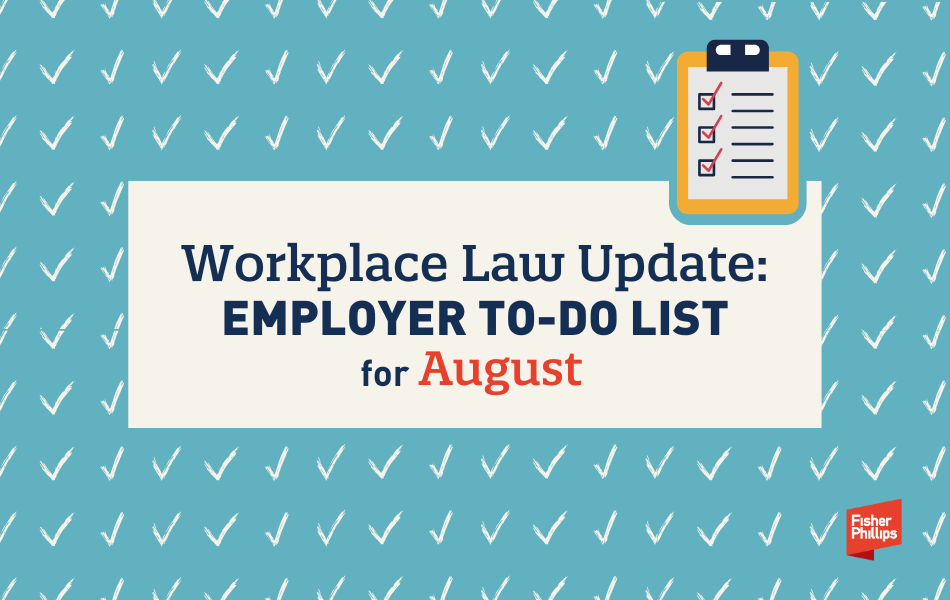Here are the top ten items you should tackle in August, based on the latest workplace law developments and upcoming critical compliance dates:

| _ | Learn how the big budget bill impacts your workplace. Don’t have time to slog through 1,000+ pages of the final “Big Beautiful Bill” signed by President Trump on July 4? Here’s an overview of the ways that the legislation impacts employers. |
| _ | Paddle into the wave of deregulation. The US Department of Labor unveiled a broad set of proposed regulatory rollbacks in July, and key proposals will impact workplace safety, employee benefits compliance, the healthcare and agriculture industries, federal contractors, and more. OSHA alone issued more than 20 new initiatives, and MSHA also crashed the deregulatory party. |
| _ | But beware of hidden hazards underwater. Many expected the Federal Trade Commission to drop a Biden-era appeal to keep the agency’s federal non-compete ban alive – but an FTC court filing last month suggests the ban may not be dead after all. Employers don’t need to take any action yet, but this has become an issue to watch. In addition, while the Office of Federal Contract Compliance Programs continues to unravel affirmative action programs, it also just revived disability and veteran enforcement for federal contractors. |
| _ | Audit your FLSA and FMLA compliance. The DOL just revived a program that rewards employers that self-report and resolve certain violations under the Fair Labor Standards Act and the Family and Medical Leave Act. Employers that qualify for the program should consider conducting a self-audit with the assistance of experienced legal counsel. In other positive wage-and-hour news, the DOL just ended its practice of demanding double back wages to resolve investigations. |
| _ | Watch for major changes from the NLRB. Once President Trump’s two new nominees for the National Labor Relations Board are confirmed as expected, we could see significant course correction of the nation’s labor law landscape. Here are five key management-friendly changes that may soon be coming from the Board. |
| _ | Get familiar with “America’s AI Action Plan.” The White House released a roadmap on July 23 for achieving “global AI dominance.” Here are the top 10 employer takeaways. Congressman Jay Obernolte touted the AI Action Plan and called for regulation of “AI outcomes, not AI tools” when he spoke at FP’s AI Conference last month. In addition, here’s how to safeguard your business from AI hallucinations and how to align your AI governance practices with strong data minimization principles. |
| _ | Use new leverage in DOL disputes, especially if you’re an H-2A employer. A federal appeals court just struck down the DOL’s use of administrative law judge (ALJ) system for imposing civil penalties on agricultural employers for H-2A violations. The decision is not only a major win for farm employers but also a new tool for all businesses to fight back against government action. Farm employers should also check out our Agricultural Employers’ Compliance Cheat Sheet. |
| _ | Track privacy and cyber law developments. Europe’s top courts just raised the bar for employee data protection. In the US, Missouri just adopted a new data breach notice law for insurers, which takes effect January 1, and New Jersey just proposed regulations that would require major privacy compliance shifts for businesses. In addition, Connecticut’s AG just settled claims over a deficient privacy notice – here are six key lessons for businesses that collect and use consumer data. Meanwhile, in California:Regulators approved on July 24 a sweeping set of rules that will impact your AI and privacy policies.The state may impose a firm deadline for providing data breach notifications to consumers, starting January 1 if a proposed bill is approved.Healthline Media agreed to a $1.55 million settlement on July 1 to resolve allegations it violated the California Consumer Privacy Act.The state’s privacy agency is now promoting consumer awareness on how to use opt-out signals.One win for businesses? A federal appeals court’s ruling on July 9 makes it significantly harder for plaintiffs to weaponize California’s wiretap law against businesses that rely on digital tools. |
| _ | Catch up on SCOTUS decisions. The Supreme Court ruled on June 27 that the federal government may continue to enforce the Affordable Care Act’s preventive-care mandates, but the Court’s rationale opened the door for political influence. That same day, SCOTUS saved the E-Rate program in a major victory for public schools and the tech companies that support them. The Court also recently agreed to review whether states can ban transgender high school and college athletes from participating on female sports teams (a final decision is expected in 2026) – here’s what’s at stake for schools and athletic organizations. |
| _ | Take stock of state law updates. In addition to reading our Employer Cheat Sheet for all the state workplace laws that just took effect July 1, here are some key state law updates and upcoming dates you should know about:Colorado will ban healthcare non-competes and non-solicits starting August 6. Here’s what employers need to know about the state’s busy legislative session that adjourned in May. Missouri employers will no longer be required to provide paid sick leave as of August 28. Nevada employers must register or certify an exemption by September 1 for a new state-facilitated retirement program for private-sector employees. The state also just expanded protections for breastfeeding effective July 1 and limited FMLA certification fees starting in 2026. New Hampshire now requires reasonable break times and spaces for employees to express breastmilk.Rhode Island recently banned “captive audience” meetings and became the first state to explicitly require workplace accommodations for menopause-related conditions. In 2026, the state minimum wage will jump to $16 per hour, and employers will be subject to new onboarding notice requirements.Texas will see a significantly limit non-competes for healthcare professionals in contracts signed on or after September 1. The state will also forbid the use of confidentiality or nondisclosure provisions that seek to cover up incidents of sexual abuse or sexual assault – “Trey’s Law” takes effect September 1 and will apply retroactively.Vermont just expanded its Parental and Family Leave Act and now covers nontraditional family structures.Washington enacted a wave of workplace laws this year, including 11 that took effect in July 2025 and eight more that will take effect in 2026 and beyond. |
We will continue to monitor developments related to all aspects of workplace law. Make sure you are subscribed to Fisher Phillips’ Insight System to get the most up-to-date information. If you have questions, contact your Fisher Phillips attorney.




Leave a Reply